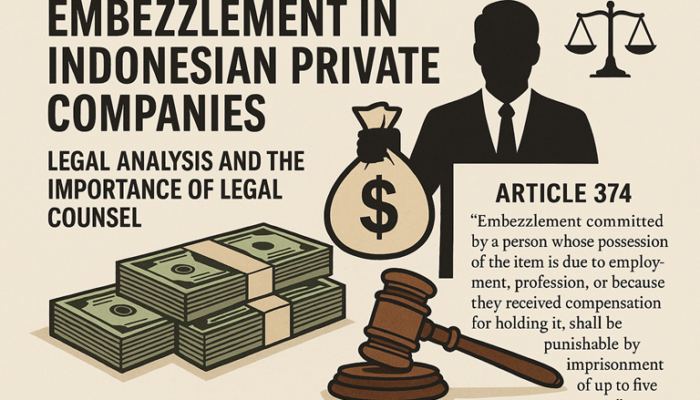I. Introduction
As Indonesian private enterprises continue to expand, embezzlement committed by insiders—commonly referred to as embezzlement in position—has become an increasingly critical risk in corporate governance. Such misconduct generally involves employees or members of management who, due to their position, gain access to the company’s funds or assets and wrongfully appropriate them for personal gain.
These acts cause not only direct financial harm but also erode internal trust, damage organizational integrity, and threaten long-term business sustainability. Therefore, resolving embezzlement cases through formal legal channels, with the assistance of experienced legal professionals, is essential.
II. Legal Definition and Statutory Basis
1. Criminal Law
Embezzlement by employees is primarily governed by the Indonesian Penal Code (Kitab Undang-Undang Hukum Pidana – KUHP). The key provision is:
-
Article 374 KUHP:
“Embezzlement committed by a person whose possession of the item is due to employment, profession, or because they received compensation for holding it, shall be punishable by imprisonment of up to five years.”
This article applies specifically to acts of embezzlement committed by employees or agents acting in the course of their duties. The maximum criminal sanction is five years’ imprisonment.
-
If the act involves fraudulent conduct, forgery, or the use of false accounting, additional provisions may apply, such as:
-
Article 378 KUHP – Fraud
-
Article 263 KUHP – Forgery of Documents
-
2. Civil Liability
In addition to criminal prosecution, companies may file civil claims under the Indonesian Civil Code (Kitab Undang-Undang Hukum Perdata), seeking restitution of misappropriated assets and compensation for damages.
III. Common Forms of Embezzlement in Private Companies
Typical manifestations of embezzlement in Indonesian private businesses include:
-
Unauthorized withdrawal of company funds by finance staff;
-
Inflated procurement contracts with the surplus siphoned off;
-
Collection of client payments withheld from company records;
-
Misappropriation of inventory through falsified warehouse records;
-
Illicit transfers of company assets to affiliated or personal accounts.
IV. Legal Consequences and Business Risks
1. Legal Consequences
-
Criminal liability: Up to 5 years’ imprisonment under Article 374 KUHP;
-
Restitution: Courts may order the return of embezzled assets and award civil damages;
-
Professional disqualification: Convicted individuals may be prohibited from holding key positions under corporate or financial regulations.
2. Corporate Risks
-
Direct financial loss: Diminished liquidity and operational setbacks;
-
Internal trust deficit: Breakdown of confidence within the management structure;
-
Reputational harm: Negative public perception impacting investors and stakeholders;
-
Regulatory exposure: Potential administrative or supervisory penalties for corporate negligence in oversight.
V. Legal Remedies: The Critical Role of Legal Counsel
When embezzlement is suspected or detected, companies must avoid informal or internal-only resolution strategies. Engaging a qualified lawyer is vital to secure the company’s legal position and ensure compliance with Indonesian law. Legal counsel provides support in the following areas:
1. Legal Investigation and Evidence Collection
Lawyers assist companies in conducting internal investigations, identifying relevant documentation, collecting admissible evidence (e.g., financial records, emails, CCTV footage), and preserving chain-of-custody to ensure legal validity.
2. Legal Risk Assessment and Opinions
An experienced lawyer can provide an objective legal opinion on whether the conduct constitutes a criminal offense and recommend whether to proceed with police reporting or file a civil lawsuit.
3. Litigation: Criminal Reporting and Civil Claims
-
Criminal complaints may be filed with the Indonesian National Police (Polri), with the lawyer preparing a formal report supported by legal analysis and documentation;
-
Civil lawsuits may be initiated in the District Court to seek recovery of assets and damages;
-
Legal counsel will represent the company throughout the criminal investigation, prosecution, and court proceedings.
4. Liaison with Government Authorities
In cases involving regulatory concerns (e.g., tax, customs, financial reporting), lawyers may represent the company in communications with relevant authorities (e.g., OJK, BKPM, BPKP) to mitigate further liability.
5. Post-Incident Governance and Compliance Enhancement
After resolving the case, lawyers can issue legal memoranda or compliance reports, advising on internal control improvements to prevent recurrence of similar risks.
VI. Conclusion
Embezzlement in position is a serious criminal offense under Indonesian law and can have devastating effects on a company’s financial health and reputation. Early engagement of legal counsel is the most effective way to address such misconduct, safeguard company assets, and pursue full legal recourse.
In addition to enabling proper criminal prosecution and civil recovery, legal counsel helps demonstrate a company’s commitment to governance, accountability, and integrity.

